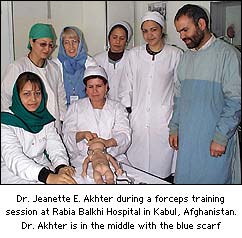Indian Health Staff in the ACOG Today News
Links Of Interest 
- Healthcare needs grow, money doesn’t
- Haffner Native Women’s Health Award
- Teaching ob/gyn care for American Indians
- Committee provides consultation to AI/AN hospitals
- Two Fellows honored for decades of serving Native American women
- US OB/GYNs helping to create residency program in Kabul
- William Haffner MD receives ACOG award
- ACOG cervical cancer screening recommendations
- Week calls attention to plight of uninsured
- Project focuses on VBAC
- Preparing for emergency cesarean
US OB/GYNs helping to create residency program in Kabul March 2005 issue of ACOG Today
 As
part of the effort to reconstruct Afghanistan’s medical infrastructure,
nine ACOG Fellows have gone to Afghanistan since 2003 to work at Rabia Balkhi
Hospital, one of four women’s hospitals in Kabul. Each ob-gyn works at
Rabia Balkhi for at least three months, as part of a project to train female
Afghan ob-gyns, nurses, midwives, and hospital staff.
As
part of the effort to reconstruct Afghanistan’s medical infrastructure,
nine ACOG Fellows have gone to Afghanistan since 2003 to work at Rabia Balkhi
Hospital, one of four women’s hospitals in Kabul. Each ob-gyn works at
Rabia Balkhi for at least three months, as part of a project to train female
Afghan ob-gyns, nurses, midwives, and hospital staff.
Launched in November 2002, the program is run by the nongovernmental organization International Medical Corps and funded by the US Department of Health and Human Services.
The program began under the leadership of Fellow William H.J. Haffner, MD, immediate past chair of ACOG’s Committee on Health Care for Underserved Women, and was continued by ACOG president-elect nominee Douglas W. Laube, MD, MEd. Dr. Laube developed the initial curriculum outline after a site visit to Kabul in 2003, in anticipation of developing a more formal US-style residency program.
 ACOG
Fellow Jeanette E. Akhter, MD, immediate past chair of ACOG’s Maryland
Section, worked at the hospital from November 2004 through January 2005. Dr.
Akhter described the complexity of the project: “In addition to training
residents and establishing a four-year curriculum, we train other hospital personnel—nurses,
midwives, OR staff, administrators, equipment handlers, and so on. And support
services need to be set up for a residency—lab, X-ray, sonogram, medical
records, cleaning services, etc. Definitely, it’s all about teamwork.”
ACOG
Fellow Jeanette E. Akhter, MD, immediate past chair of ACOG’s Maryland
Section, worked at the hospital from November 2004 through January 2005. Dr.
Akhter described the complexity of the project: “In addition to training
residents and establishing a four-year curriculum, we train other hospital personnel—nurses,
midwives, OR staff, administrators, equipment handlers, and so on. And support
services need to be set up for a residency—lab, X-ray, sonogram, medical
records, cleaning services, etc. Definitely, it’s all about teamwork.”
Saving Mothers’ Lives
In 2002 Afghanistan’s nationwide maternal mortality rate was 1,600 out of every 100,000 live births, according to the Centers for Disease Control and Prevention. The IMC reports that for deliveries at Rabia Balkhi Hospital, the maternal mortality was about 600 per 100,000 when the US project began. The maternal mortality rate at the hospital has now dropped to about 200 per 100,000, and some months have had no maternal deaths.
“On average there are 35–50 deliveries a day,” Dr. Akhter said. “About 70% of the deliveries are normal, and the woman goes home in a few hours. Women who have had a cesarean delivery, about 10%, stay at the hospital a week.”
Establishing a Medical Library
 California
Fellow John J. Ryan, MD, worked at Rabia Balkhi Hospital for six months beginning
in August 2004. Working with two US librarians, he created a medical library
at the hospital after noticing that medical books and journals were kept locked
up because hoarding and theft were common.
California
Fellow John J. Ryan, MD, worked at Rabia Balkhi Hospital for six months beginning
in August 2004. Working with two US librarians, he created a medical library
at the hospital after noticing that medical books and journals were kept locked
up because hoarding and theft were common.
“It’s good to see residents and the staff carrying books now,” he said.
Dr. Ryan summed up the Kabul project: “Progress has been made, thanks to the help of volunteer ACOG physicians, midwives, nurses, and IMC staff, who have taught and helped the Afghanistan residents to join the modern age. Very many countries, large and small, have been contributing to Afghanistan. It is truly a world effort.”
Any material from ACOG Today is the sole possession of the American College of Obstetricians and Gynecologists and is used by permission of American College of Obstetricians and Gynecologists without alteration. Please contact ACOG Today for any questions.

